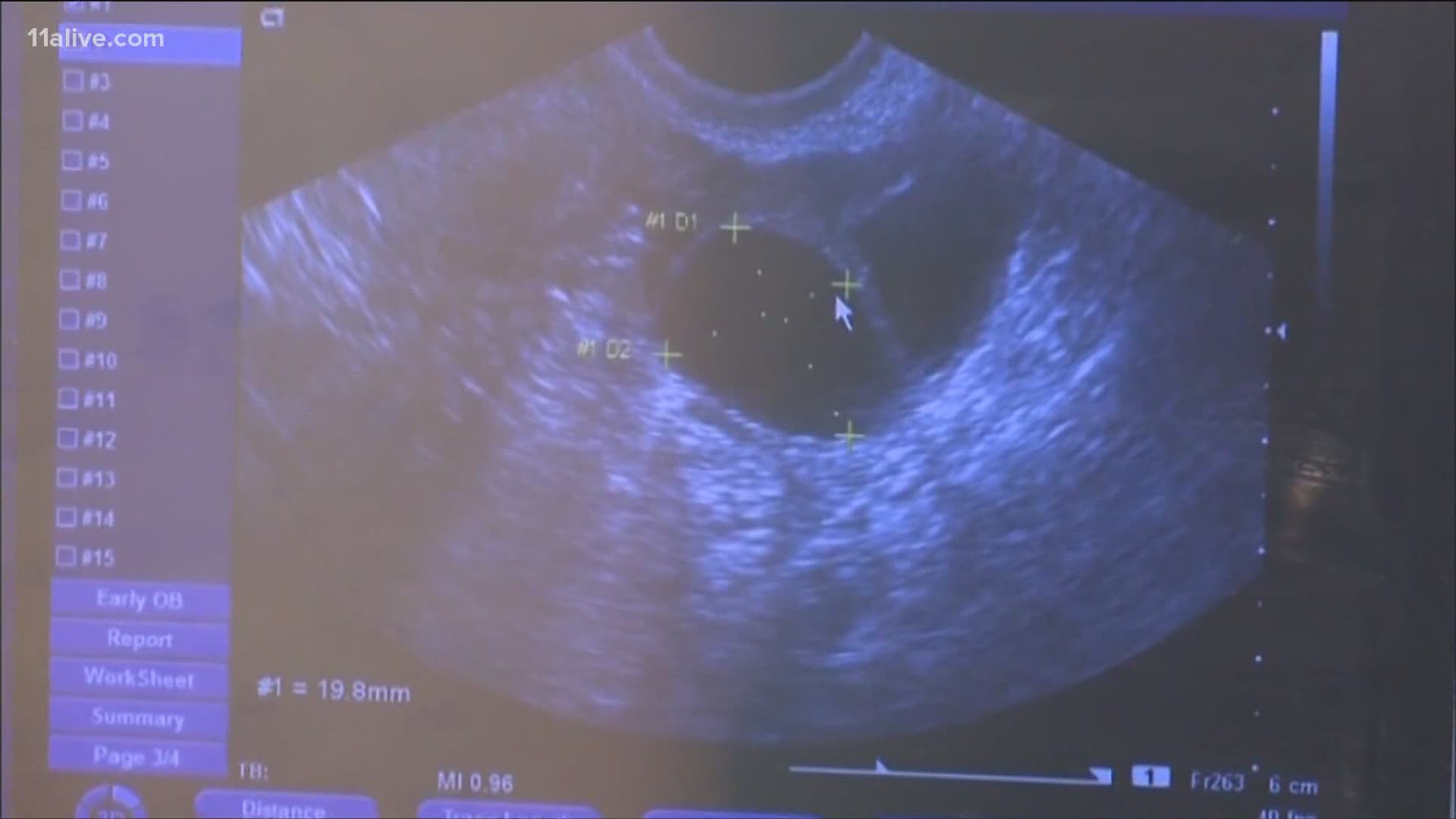ATLANTA — If the Supreme Court overturns Roe v. Wade, as a draft opinion reported by Politico on Monday night indicates is a strong possibility, it would quickly bring into effect Georgia's controversial 2019 "heartbeat" abortion law.
The most widely-reported and discussed provision of that law, H.B. 481, banned abortions once a "fetal heartbeat" could be detected - generally speaking, about six weeks into a pregnancy.
The law was quickly struck down by a federal judge as unconstitutional after it was passed, so it was never all that closely dissected in full.
But H.B. 481 actually provides for many other regulations that would suddenly become standing law in Georgia after a Supreme Court decision overturning Roe. Here's an overview of the rules that would go into place if the "heartbeat" bill goes into effect.
Defining life and restricting abortion
This, of course, is the most consequential part of the law.
Section 3 amends how Georgia defines life, to include fetuses and embryos with the clause: "'Natural person' means any human being including an unborn child."
It further adds: "'Unborn child' means a member of the species Homo sapiens at any stage of development who is carried in the womb."
From there, the law defines how abortions are to be restricted in Section 4.
It says that no abortion shall be performed if an unborn child has a "detectable human heartbeat."
That is defined in the previous section as an "embryonic or fetal cardiac activity or the steady and repetitive rhythmic contraction of the heart within the gestational sac." Section 8 of the law also directs the Georgia Department of Public Health to note in its official guidance that, "As early as six weeks' gestation, an unborn child may have a detectable human heartbeat."
Abortion of an unborn child after the detection of a fetal heartbeat, according to the law, may only occur when:
- A physician determines a medical emergency exists.
- A physician determines the pregnancy is "medically futile."
- The pregnancy is a result of rape or incest, "in which an official police report has been filed alleging the offense of rape or incest," and the pregnancy has not yet surpassed 20 weeks.
Defense against prosecution
The law lays out several instances in which a woman may defend herself against prosecution if an abortion is performed outside the bounds of the law.
- If a licensed physician, registered nurse, licensed pharmacist or licensed physician's assistant provides care that results in the "accidental or unintentional injury or death of an unborn child."
- If a woman "sought an abortion because she reasonably believed that an abortion was the only way to prevent a medical emergency."
Can doctors be held criminally liable?
This question is difficult to answer because the law is not particularly explicit about criminal liability except with respect for pregnant women.
Deborah Dinner, an Emory University School of Law professor, told 11Alive in 2019 that it appeared that doctors might be held criminally liable if they performed an abortion without themselves having a copy of the police report a woman is required to file in the case of rape or incest.
"The doctor might not need to have a copy of such a report in hand. But, the requirement that women file the report puts the doctor in a tough position. If he or she did not have a copy of the report him or herself, then it would be difficult to have certain knowledge that one was filed," she said.
Can a woman be held criminally liable for going out of state to get an abortion?
While other states have enacted laws that would still punish women for seeking an abortion out-of-state, Georgia's law has no such clause.
Can a woman be held criminally liable for a miscarriage?
The language of the law holds that abortion "means the act of using, prescribing, or administering any instrument, substance, device or other means with the purpose to terminate a pregnancy with knowledge that termination will, with reasonable likelihood, cause the death of an unborn child."
It stipulates, however, that an abortion will not be held to have occurred under the circumstances of:
- "Removing a dead unborn child by spontaneous abortion."
- "Removing an ectopic pregnancy."
A "spontaneous abortion" is another term for a miscarriage, while an ectopic pregnancy is one that occurs outside the uterus and therefore is not viable.
So the bill does distinguish a miscarriage.
However, Dinner explained in 2019 that a woman who miscarried would "have to prove that she had a naturally occurring miscarriage."
"If she miscarried because she ingested a drug such as Misoprostol with the intention of producing an abortion, or if she ingested another drug (legal or illegal) knowing that it would 'with reasonable likelihood' result in an abortion, then she would be criminally liable," Dinner said.
Child support
Section 5 of the law provides for allowing a court to impose child support on the father of an unborn child in the "amount of direct medical and pregnancy-related expenses of the mother of the unborn child."
Damages
The law also provides in Section 4 for a woman to recover damages from whomever provided the abortion if it was done in violation of the law.
"Any woman upon whom an abortion is performed in violation of this Code section may recover in a civil action from the person who engaged in such violation all damages available to her under Georgia law for any torts."
Similarly, Section 6 of the law provides for the "right to recover the full value of the life" in the event of a homicide of a child, beginning "at the point at which a detectable human heartbeat... is present."
Tax implications
The law provides for allowing women to claim an unborn child as a dependent for tax filing purposes.
"...any unborn child with a detectable human heartbeat... shall qualify as a dependent minor."

